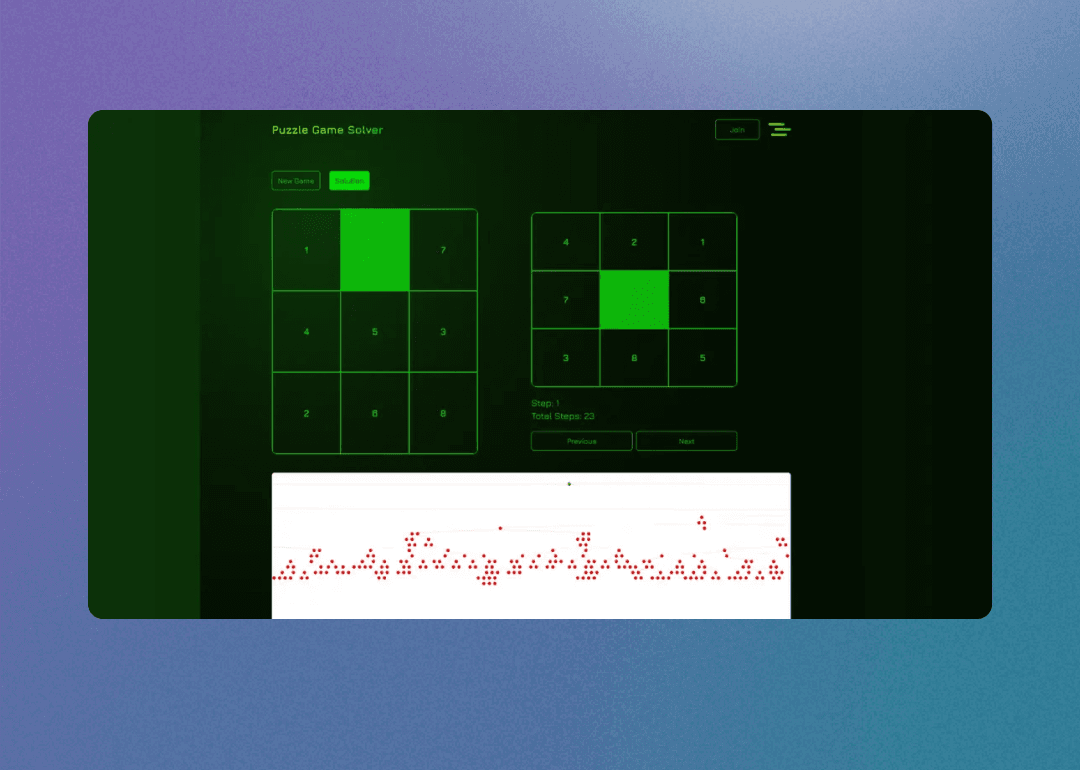An intelligent web application that solves the classic 8-puzzle problem using advanced algorithms and provides interactive visualization of the solution process.
Overview
The Puzzle Solver is a sophisticated web application that demonstrates the power of artificial intelligence algorithms in solving complex problems. Built to tackle the famous 8-puzzle sliding puzzle, it uses the A* search algorithm combined with the Manhattan distance heuristic to find optimal solutions efficiently.
Key Features
- A* Algorithm Implementation: Advanced pathfinding algorithm for optimal solution discovery
- Manhattan Distance Heuristic: Intelligent estimation function for efficient state space exploration
- Interactive Visualization: Real-time visualization of the solution path and algorithm progress
- Solution Tree Display: Visual representation of the algorithm's decision-making process
- Performance Analytics: Detailed metrics on algorithm performance and efficiency
- User-Friendly Interface: Intuitive controls for puzzle input and solution visualization
Technology Stack
Frontend
- React: Modern JavaScript library for building interactive user interfaces
- Interactive Components: Custom components for puzzle visualization and control
- Responsive Design: Optimized for various screen sizes and devices
Backend
- Node.js: JavaScript runtime for server-side algorithm implementation
- Express: Web framework for RESTful API development
- REST API: Clean API architecture for puzzle solving requests
Algorithm
- A* Search Algorithm: Optimal pathfinding algorithm for state space exploration
- Manhattan Distance Heuristic: Efficient estimation function for puzzle solving
- State Space Management: Optimized data structures for puzzle state handling
Development Timeline
Project Duration: March 2023 - April 2023 (1 month)
This focused development period concentrated on implementing the core algorithm, building the API, and creating an engaging user interface for puzzle visualization.
Live Demo
🌐 Live Application: puzzle-solver-lovat.vercel.app 📂 Source Code: GitHub Repository
Algorithm Details
A* Search Implementation
The A* algorithm efficiently explores the puzzle state space by:
- Cost Function: Combining actual cost (g) with heuristic estimate (h)
- Priority Queue: Using optimal node selection for exploration
- State Management: Tracking visited states to avoid cycles
- Path Reconstruction: Building the complete solution path
Manhattan Distance Heuristic
The heuristic function calculates:
- Distance Estimation: Sum of Manhattan distances for each tile to its goal position
- Admissible Property: Never overestimates the actual cost to goal
- Consistency: Ensures optimal solution discovery
Visualization Features
- Step-by-Step Solution: Animated progression through the solution path
- Algorithm Tree: Visual representation of the search tree exploration
- Performance Metrics: Real-time display of nodes explored and solution efficiency
- Interactive Controls: Play, pause, and step through solution at user's pace
Technical Achievements
- Optimal Solutions: Guaranteed to find the shortest solution path
- Efficient Performance: Optimized algorithm implementation for fast solving
- Scalable Architecture: Clean separation between algorithm logic and presentation
- Educational Value: Clear visualization helps understand AI search algorithms
Impact
The Puzzle Solver project successfully demonstrates the practical application of artificial intelligence algorithms in problem-solving scenarios. It serves as both a functional tool for solving 8-puzzles and an educational resource for understanding how AI search algorithms work in practice.
The project achieves its goal of solving the 8-puzzle problem efficiently while providing valuable insights into algorithm performance and optimization techniques. It establishes a solid foundation for further research and development in puzzle-solving algorithms and AI applications.
